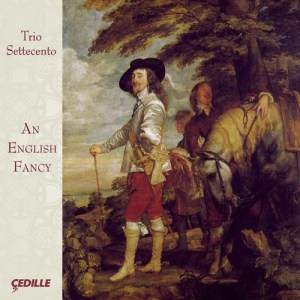As Rachel Barton Pine says in her ‘Personal note’, in
the detailed and useful booklet, “This is the fourth and last album in
Trio Settecento’s series surveying 17th and 18th
Century music from different European regions.” I seem to have missed
the others. What about you? They are An Italian Sojourn, A German Bouquet and A French Soirée. As a result of hearing
this disc I may well look them up.
Trio Settecento play violin, viol da gamba, harpsichord and positiv
organ and the booklet gives us much detail on their antecedents. The violin
is a replica of a renaissance instrument. Barton Pine who is a well known
and virtuosic performer in America explains how the instrument varies from a
modern version. Some English music of this period was also written for lyra
viol which is a sort of bowed lute. Tobias Hume is something of an
eccentric figure but much of his music and Captain Hume’s
Lamentation was written for it.
The CD traces a history of consort music from Byrd to
Purcell. The former is represented by a transcription a piece from the
Fitzwilliam Virginal Book of Sellenger’s
Rowndewhich consists of the tune and of eight variants. Other
performers have made such transcriptions but this is a little different in
that just the three instruments are used. A lack of colour is an obvious
ailment compared with a mixed consort. That said, the playing is energetic
and fresh and, one feels, quite authentic. There is variety along the way
including the odd passage where the violin drops out - as in the whole of
variation 6 - or where the melody is moved to a different part.
There is much here to enjoy. William Lawes’ Fantasia
Suites are quite extraordinary. A fine complete recording can be found
on Harmonia mundi HMC 901423 by London Baroque. The present three movement
work enables the listener to enjoy a taste of the composer’s unique
style.
John Jenkins is another intriguing figure whose long life
produced music that is technically flawless and of a rich and personal
quality. Only now is it being fully explored. Listen to Phantasm’s
recording of the Five Part consorts on Avie AV2120. The Three movement Suite No. 2 opens with a
lengthy and explorative Fantasia. It then drifts into a melodious
Air and ends with a Corant.
We are told that if we go onto iTunes we can download a track which
didn’t make it onto the CD: a Sonata by another rare voice in English
music at the time, one Henry Butler (d.1652), a great virtuoso. I did
download it and have to say that I am sorry that space couldn’t have
been found for it. We could have had it in place of some of Christopher
Simpson’s somewhat workmanlike Suite in G minor. This consists of
seven short movements that include a Sarabande which here, and in the
example later by Matthew Locke is taken a sprightly pace. The tempo adopted
is all right and proper and defies the dismal funereal atmosphere often
associated with the form.
Locke was a significant figure who worked for Charles II and
other notables. This piece and a Sonata in G minor by Butler can be found on
a Harmonia mundi disc from the Newberry Consort (HMC 190713). Like the
collection of Locke’s chamber works it is called For Several
Friends. There are six movements. Here the opening Fantazie (sic)
is the shortest one acting as a curtain-raiser to the longer elegant
Pavan which follows. Listen out for Locke’s extraordinary sense
of modulation. Anyone with a strong interest in Locke should search out The
Parley of Instruments’ disc of Locke’s Broken Consort
(Hyperion CDA 66727 reissued as Helios
CDH55255).
It’s good to have Thomas Baltzar represented. He was
considered a remarkable performer in his day. His variants on John Come
Kiss me now are intriguing. As John Mark Rozendaal tells us, in his
essay, Baltzar was famous for his multi-stopping, use of the highest
register and agility in passagework. Sadly this is not in evidence in any of
his surviving compositions but as we are told: “Rachel Barton Pine has
adapted this piece to include passages to the seventh position”.
The remainder of the disc is given over to Purcell with
extracts from six of his theatre pieces. Apparently he wrote, in all, for
some fifty productions; what he achieved in his brief lifetime is almost
incalculable. There is also the Pavan in B flat, then out of fashion
but written almost as an exercise by the teenage composer.
All in all this is a fascinating and worthwhile collection
excellently documented. It offers a varied but consistent over-view of the
chamber music available to the 17th Century English house and
court.
Each of the three performers is a star and it's good that David
Schrader has had a chance to play solo for one of the Purcell
pieces: the Overture from the little known Bonduca.
John Mark Rozendaal, whose detailed and clear notes I have already
mentioned, is no mere supporter on the gamba. The whole enterprise
on this generously filled disc is cleverly played and cleanly
recorded.
Gary Higginson
Support us financially by purchasing this disc from:
|
|
|
|
|
|
|















